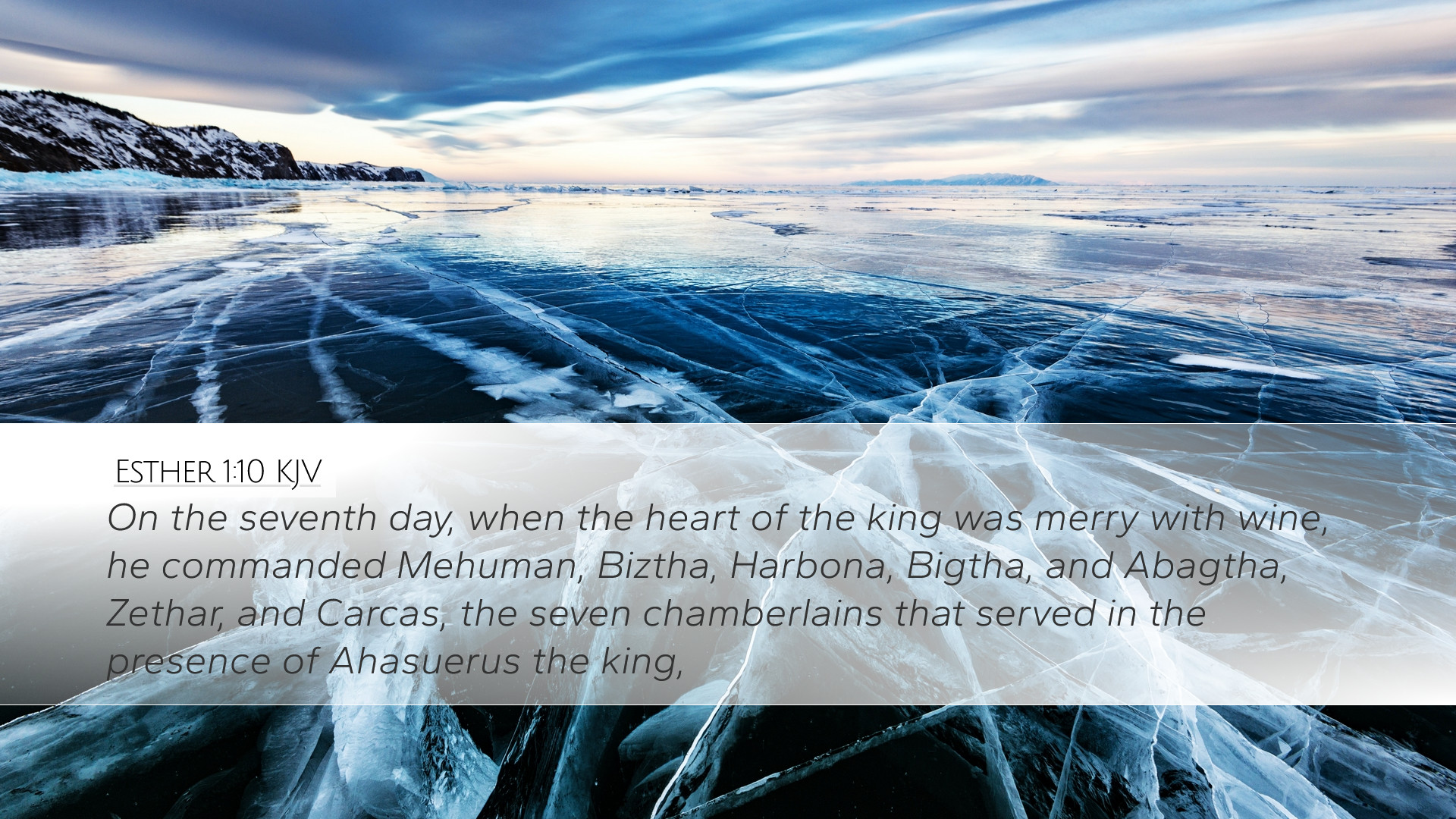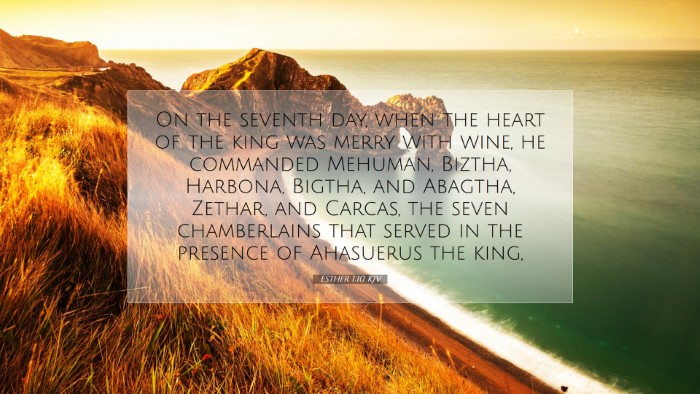Old Testament
Genesis Exodus Leviticus Numbers Deuteronomy Joshua Judges Ruth 1 Samuel 2 Samuel 1 Kings 2 Kings 1 Chronicles 2 Chronicles Ezra Nehemiah Esther Job Psalms Proverbs Ecclesiastes Song of Solomon Isaiah Jeremiah Lamentations Ezekiel Daniel Hosea Joel Amos Obadiah Jonah Micah Nahum Habakkuk Zephaniah Haggai Zechariah MalachiEsther 1:10
Esther 1:10 KJV
On the seventh day, when the heart of the king was merry with wine, he commanded Mehuman, Biztha, Harbona, Bigtha, and Abagtha, Zethar, and Carcas, the seven chamberlains that served in the presence of Ahasuerus the king,
Esther 1:10 Bible Commentary
Commentary on Esther 1:10
Esther 1:10 states: "On the seventh day, when the heart of the king was merry with wine, he commanded Mehuman, Biztha, Harbona, Bigtha, Abagtha, Zethar, and Carcas, the seven eunuchs who served in the presence of King Ahasuerus," This verse presents a critical moment in the narrative of Esther and sets the stage for the unfolding events of the Book.
Contextual Background
The events leading up to this moment take place during a lavish feast hosted by King Ahasuerus (commonly identified with Xerxes I of Persia). This rich, opulent feast lasted for six months and culminated in a seven-day banquet for all who were present in the palace. Ahasuerus's actions represent not only the power of the monarchy but also the potential dangers of indulgence and excess.
The King's Condition
The verse opens with the observation that "the heart of the king was merry with wine." This phrase has deep implications, indicating a state of both physical inebriation and emotional buoyancy. Commentary reflects on how the influence of alcohol often exacerbates the vulnerabilities of leadership, and Ahasuerus's intoxicated state renders him susceptible to impulsive decisions.
Insights from Matthew Henry
According to Matthew Henry, this passage underscores the folly that accompanies drink, particularly in the realm of authority. He elaborates on the psychological dimension, suggesting that when a leader is under the influence, they may act without heed to propriety or consequence. The king’s merry state is showcased as an indication of the hollowness of his revelry, as it often leads to decisions rooted in superficiality rather than wisdom.
Insights from Albert Barnes
Albert Barnes emphasizes that the historical context is pivotal in understanding the king’s decisions. He posits that the actions of King Ahasuerus reflect a broader theme of power and the role of influence within ancient courts. The presence of the seven eunuchs signifies the king's reliance on trusted advisors to carry out his wishes, which raises questions about the nature of power dynamics in such environments.
Insights from Adam Clarke
Adam Clarke delves into the symbolic meaning of the king’s act of summoning his eunuchs. He interprets it as an event that could be seen as a stark portrayal of vanity and pride. Clarke draws attention to the fact that the summons of the queen (as will follow in subsequent verses) is steeped in a culture that objectifies women, revealing patriarchal structures deeply entrenched in Persian society.
Symbolism of the Seven Eunuchs
The enumeration of the seven eunuchs—Mehuman, Biztha, Harbona, Bigtha, Abagtha, Zethar, and Carcas—holds significant symbolism. These individuals are not just servants; they represent the various facets of the king’s court. Each eunuch may symbolize different aspects of the king's rule: protection, counsel, and unwavering loyalty.
- Mehuman: Possibly representing valor or courageous spirit.
- Biztha: Perhaps symbolizing discernment or wisdom.
- Harbona: Could embody swiftness, performing his commands rapidly.
- Bigtha: Commonly seen as the embodiment of fidelity.
- Abagtha: A characterization of humility and service.
- Zethar and Carcas: Both representing unique qualities of dependability and diligence.
The Role of Alcohol in Leadership
This verse serves as a cautionary note about the impairments that indulgence can bring upon decision-making processes, especially among leaders. In the broader theological and ethical discussions within the church, this resonates with warnings against the pitfalls of luxury and excess.
Lessons for Leadership
As pastors and theologians reflect on this passage, it becomes important to derive spiritual leadership lessons. The narrative suggests that effective leadership requires discernment that is often clouded by indulgences, be they alcohol or other distractions. Ahasuerus serves as an archetype of what can happen when leaders lose sight of their responsibilities due to superficial pleasures.
Application for Modern Readers
When engaging with Esther 1:10, modern readers, including pastors and students, are reminded of the necessity for integrity and self-control in all areas of life, especially when wielding authority. The Apostle Paul echoes similar sentiments in his epistles, encouraging leaders to be temperate and vigilant.
Conclusion
Esther 1:10 invites a multitude of reflections on power, indulgence, and the dynamics of authority. It is a reminder of the potential for judgment born out of unwise decisions made in moments of folly. As the narrative unfolds, readers are drawn into deeper considerations of providence, justice, and divine sovereignty, with themes that extend well beyond antiquity into the heart of contemporary Christian living.


